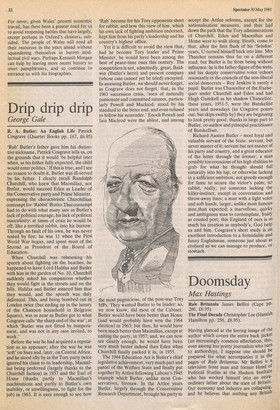Drip drip drip
George Gale
R. A. Butler: An English Life Patrick Cosgrave (Quartet Books pp. 167, £6.95) 'Ralf Butler's father gave him his distinctive nickname, Patrick Cosgrave tells us, on the grounds that it would 'be helpful later when, as his father fully expected, the child would enter politics.' If this is true, and I see no reason to doubt it, Butler was ill-served by his father. I clearly recall Randolph Churchill, who knew that Macmillan, not Butler, would succeed Eden as Leader of the Conservative party and Prime Minister, expressing the characteristic Churchillian contempt for 'Rabbit' Butler.That contempt had to do with what many saw as Butler's lack of political courage, his lack of political masculinity: at times of crisis he would be off, like a terrified rabbit, into his burrow. Through no fault of his own, he was never tested by fire: he was 11 when the First World War began, and spent most of the Second as President of the Board of Education.
When Churchill was rehearsing his speech about fighting on the beaches, he happened to have Lord Halifax and Butler with him in the garden of No. 10. Churchill suddenly asked his companions whether they would fight in the streets and on the hills. Halifax and Butler assured him that they would, and the speech was duly delivered. This, and being bombed out in London twice (but ending up in the luxury of the Channon household in Belgrave Square), was as near as Butler got to what Cosgrave calls 'the sharp end of the war', at which 'Butler was not fitted by temperament, and was not in any case invited, to work.'
Before the war he had acquired a reputation as an appeaser; after the war he was 'soft' on Suez and, later, on Central Africa; and he stood idly by as the Tory party twice ignored his claim to its leadership, Macmillan being preferred (largely thanks to the Churchill faction) in 1957 and the Earl of Home (thanks partly to Macmillan's machinations and partly to Butler's own inability, or unwillingness, to fight for the job) in 1963. It is easy enough to see how `Rab' became for his Tory opponents short for rabbit; and how this view of him, which his own lack of fighting ambition endorsed, kept him from his party's leadership and his country's highest office.
Yet it is difficult to avoid the view that, had he become Tory leader and Prime Minister, he would have been among the best of peace-time ones this century. The competition is not, admittedly, great, Baldwin (Butler's hero) and present company (whose case cannot yet be tried) excepted. In assessing Butler, we should never forget, as Cosgrave does not forget, that, in the 1963 succession crisis, 'men of naturally passionate and committed natures, particularly Powell and Macleod, stood by his standard to the bitter end, and even refused to follow his surrender.' Enoch Powell and lain Macleod were the ablest, and among the most pugnacious, of the post-war Tory MPs. They wanted Butler to be leader; so, we now know, did most of the Cabinet. Butler would have been better than Home (and would probably have won the 1964 election) in 1963; but then, he would have been much better than Macmillan, except at uniting the party, in 1957; and, we can now see clearly enough, he would have been very much better indeed than Eden when Churchill finally packed it in, in 1955. The 1944 Education Act is Butler's chief legislative achievement, very much part and parcel of the Welfare State and finally put together by Attlee following Labour's 1945 triumph which Butler, unlike most Conservatives, foresaw. In the Attlee years Butler, largely through the Conservative Research Department, brought his party to accept the Attlee reforms, except for the nationalisation measures, and thus laid down the path that the Tory adminstrations of Churchill, Eden and Macmillan and Home were to walk along. Heath, come to that, after the first flush of his `Selsdon' years, U-turned himself back into line. Mrs Thatcher remains thus far on a different road, but Butler is far from being without influence: he is the father-figure of the wets, and his deeply conservative voice echoes resonantly in the councils of the non-liberal social democrats — Roy Jenkins is surely a pupil. Butler was Chancellor of the Exchequer under Churchill and Eden and had Hugh Gaitskell as his shadow Chancellor: these years, 1951-5, were the Butskellist years and nowadays (as Cosgrave points out, but skips swiftly by) they are beginning to look pretty good, thanks in large part to Butler, co-author and principal practitioner of Butskellism.
Richard Austen Butler — most loyal and valuable servant of the State: servant, but never master of it; servant but not master of his party and country, and a great educator of the latter through the former; a man possibly too conscious of his high abilities to grab for what he thought should fall naturally into his lap, or otherwise lacking in a sufficient ambition, not greedy enough for fame to secure the victor's palm; no rabbit, really, yet someone lacking the killer-instinct, except in conversation and throw-away lines; a man with a light voice and soft hands, larger, unlike most famous men,than expected; a marvellous, quirky and ambiguous man to contemplate, fruity as crusted port; this England of ours is as much his creation as anybody's, God help us and him. Cosgrave's short study is an excellent introduction to a formidable and funny Englishman, someone just about as civilised as we can manage to produce, or stomach.










































 Previous page
Previous page